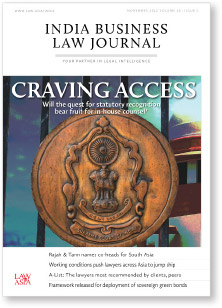In-house counsel groups lobby for change
In the past two years, the in-house counsel community has been talking vocally about the need for statutory recognition for the profession. Industry groups, such as the General Counsel Association of India, have been using events as a platform to build awareness and rally support for the cause. They have even hosted former Supreme Court judges who have spoken favourably about in-house counsel getting statutory recognition. The advantages of this would mean attorney-client privilege, in-house counsel being able to form a body that sets rules of professional conduct in addition to appearing in judicial and quasi-judicial forums on behalf of clients.
Currently, in-house counsel are unable to do so as the Advocates Act only permits advocates to appear in court. Under Indian law, in-house counsel are classified as employees and not recognised as lawyers or advocates. Attorney-client privilege would mean that in-house counsel will not be subject to discovery in litigations. That is, information shared with them would not need to be disclosed to the opposite party in a trial.

India Business Law Journal
So how far have in-house counsel come along to secure these rights for themselves? Our Cover story finds that despite in-house counsel associations voicing this demand, much distance has to be covered before this goal can be realised. Lalit Bhasin, the president of the Society of Indian Law Firms, suggests that the in-house counsel associations should unite their efforts for quicker results. The key hurdle for in-house counsel to overcome is to bring about an amendment of the Advocates Act and to press the government to introduce a bill in parliament.
Our Spotlight article looks at the discontent among lawyers in the region due to being overworked and facing enormous deadline pressures. In his popular 1930s essay, economist John Maynard Keynes predicted that humanity was moving towards an age of leisure. Where “purposeful moneymakers” would carry everyone into the lap of economic abundance. The problem, people would face is having too much free time. However, this dream of more leisure never materialised and one of the professions most betrayed by this illusion is the legal one.
The development of computer technology and the internet did not mean the work would be done quicker. But instead, there would be more work to do. The recent Wolters Kluwer Future Ready Lawyer Survey 2022 also finds that legal organisations are not delivering on the expectations of their workforce and warning that 70% of corporate lawyers are likely to leave their current positions in the next year. Though our article looks at larger trends occurring in Asia, the situation in India is no different with people moves occurring across hierarchies owing to long hours and poor remuneration. In this regard, the pandemic has proven to be a watershed moment forcing many lawyers to reassess their working conditions and press the reset button where they feel unfairly treated.
Our Intelligence Report is devoted to the subject of green bonds. The government has recently released the framework for the issuance of sovereign green bonds – that is, bonds issued by the government for the financing of green projects. The article examines the process for the identification of a green project, how the finance ministry would select and evaluate such projects and finally how the proceeds would be managed. This follows on from the stated objective to issue green bonds for financing green infrastructure in the Union Budget of 2022-23. The author advises creating a priority list of strategic green projects based on the goals outlined in India’s nationally determined contributions so a pipeline of projects for financing can be put in place. Simultaneously, it can work to shore up investor demand to absorb these green bond deals.
Our current edition of the A-List brings to you the lawyers who are most recommended by clients and peers. The article explores the long-standing associations between clients and lawyers and the bonds they’ve developed over the years. As in previous years, the A-List identifies the star performers – lawyers who are credited for their impeccable client service and their ability to take on complex deals – and the subset of icons – the household names of the legal industry whom clients turn to for their trustworthy counsel. Our February issue will be highlighting Future Legal Leaders – lawyers who have been commended for showing great promise and we ask you to stay tuned for the release of that list.



























